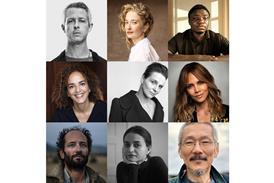Dir. Amos Gitai. Israel-France. 2003.
A collage of several plots (alila in Hebrew means plot) combine to deliver a composite picture of the country, as it is today in Gitai's new film. Originally headed for Cannes but finally emerging in Venice, Alila is one of his least overtly militant and one of his most emotionally charged in a long time. Working from a similarly, but far more detailed, novel by Yehoshua Knaz, one of Israel's best writers, this collection of personal stories carries a symbolic resonance while still respecting individuality of each character. Closest in spirit to his earlier Day By Day and almost conventionally structured, it is one of Gitai's more accessible pictures. It could cross over from the restricted art-festival circuit where most of his previous had an envious but limited career, to wider distribution.
Shot in one of Tel Aviv's more disreputable neighbourhoods, taken over by foreign illegal workers, the picture follows the comings and goings of the inhabitants in one dilapidated old house. Predictably enough, each one of them is a representative type on his own.
They include a Holocaust survivor (Karmon) who lives with his nightmares and a Chinese caretaker (Shiao Zamir); a lonely old man (Berkowitch) whose only company is his dog; a couple of Oriental Jews (Elkabetz and Beto) building without permission an extension to their flat; a divorced contractor (Klausner) who uses illegal labour to build it for them; his plump ex-wife (Laszlo) who has had enough of her former husband's depressive moods and keeps a young man (Levo) in her flat to brighten up her mature days; their 18 year old son (Mestechkin) who went AWOL almost as soon as he was drafted; and a couple (Abekassis and Lavie) using one of the flats as a hideaway illicit love nest
All around them there are masses of silent Orientals illicitly imported to replace the Arab labour force considered too risky to use. To use Gitai's own terminology, each of these separate plots is a 'block': once put together, they make the house Israel is supposed to live in.
Faithful to his particular film language, each block is a film sequence made up of one single shot, opening and closing with a dissolve, all under the masterful control of cinematographer and Gitai regular Renato Berta.
Every sequence is, technically speaking, a stand alone unit, with a distinct mood and atmosphere of its own, varying from pathetic to sardonic, from soulful to obsessive. There is no dramatic development in the accepted sense of the world in any of the narrative lines developed here. Rather they are like a series of pertinent insights on Israel's present condition, leading to an ending that, even with all its politically complex connotations, is still less preachy than Gitai's tradition would require.
The problem, as with much of Gitai's previous work, lies with his approach, which is purely intellectual but rarely moving. It makes much of the film a nicely balanced, correctly assessed, but rather remote affair; everybody says the right things at the right time, everything in it makes sense but is strangely cool.
Yet at certain moments, when the camera watches, in perfect silence, the picture suddenly takes on another dimension and transcends to a different level. It happens when the Chinese caretaker, left alone in her employer's flat, listens to a song from back home, or when the contractor's wife wakes up in the middle of the night from what was obviously a nightmare.
Performances vary. Klauzner's is affecting as the restlessly tormented father, who is torn between the ethical and moral standards he was brought up on and his devotion to his son, who rejects them all, on the other hand. Elkabetz' broad, over-the-top parody of a vulgar Sephardi policewoman, is uncomfortably close to a slur on the entire community she is supposed to represent in the film. In between, there are sympathetic performances from Laszlo and Levo, and a ferocious display of hedonistic fury by Abecassis and Lavie, who engage in some torrid, though particularly cold, sex.
Prod cos: Agav Hafakot, ICP, Hamon, MP Productions, Agav Films, Intereurop, Arte France Cinema, Yehoshua Rabinovitch Foundation
Int'l sales: Celluloid Dreams
Prods: Gitai, Michael Tapuach, Laurent Truchot
Scr: Gitai, Marie-Josee Sanselme
Cinematography: Renato Berta
Ed: Kobi Netanel, Monica Coleman
Prod des: Miguel Markin
Costumes: Laura Dinulescu
Sound: Daniel Olivier, Alex Claude
Main cast: Yael Abecassis, Uri Klauzner, Hanna Laszlo, Ronit Elkabetz, Amos Lavie, Lupo Berkovitch, Liron Levo, Yosef Karmon, Amit Metechkin, Lyn Shiao Zamir







![The Brightest SunScreen[Courtesy HKIFF]](https://d1nslcd7m2225b.cloudfront.net/Pictures/274x183/3/5/0/1448350_thebrightestsunscreencourtesyhkiff_312678.jpg)











No comments yet